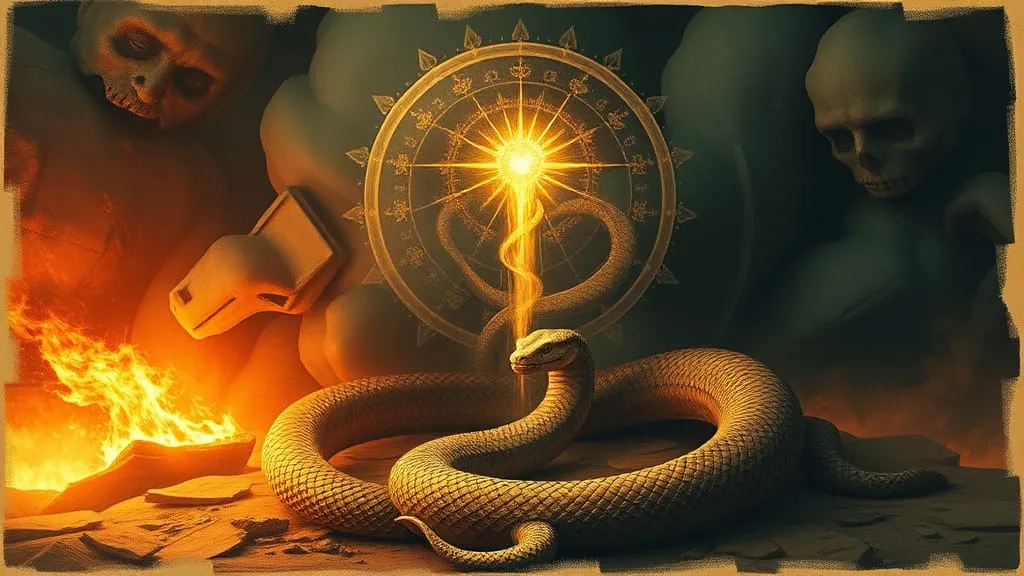Men read the Book of 2 Samuel and they see a political thriller, the biography of a great king. They get fascinated by David's rise to power, then fixate on his great "sin" with Bathsheba. They turn it into a morality play about how even the best men can fall, followed by a comforting story of forgiveness. This is a shallow reading for spiritual children.

2 Samuel is not the story of a man's moral failure. It is an advanced, terrifying manual on the profound dangers that face a spiritually awakened soul. It's the autopsy of what happens after you've defeated Goliath and the ego-king Saul is dead. It demonstrates that the ego is never truly gone. It is a serpent that lies dormant, waiting for a single moment of spiritual complacency to strike.
1. The King on the Throne: The Awakened State
The book begins with David, the man after God's own heart, taking his rightful throne. This is the allegory for the Spirit (represented by David) finally assuming kingship over the soul after the ego (Saul) has been deposed. David conquers Jerusalem and brings the Ark of the Covenant—the very presence of God—to the center of his kingdom. He dances with abandon before the Lord, a state of pure, uninhibited spiritual joy.
His wife Michal, Saul's daughter, represents the religious ego. She despises his authentic, emotional connection to God. "She despised him in her heart." (2 Samuel 6:16). The cold, religious mind is always disgusted by the genuine, passionate life of the Spirit. This is the soul in its highest state: the Spirit rules, the Presence is central, and the religious ego is barren and cast aside.
2. The Idle King: The Moment of Spiritual Laziness
The entire tragedy hinges on one verse: "In the spring, at the time when kings go off to war, David remained in Jerusalem." (2 Samuel 11:1).
The spiritual life is a constant war against the residual forces of the ego. But David, the Spirit-led king, got comfortable. He became idle. In that moment of spiritual complacency, his guard was down. His eye, no longer focused on the battle, wandered. He saw Bathsheba.
Bathsheba is not just a woman. She is the embodiment of worldly desire. The idle consciousness, no longer at war, becomes vulnerable to the pull of the flesh. This one moment of looking, of entertaining the desire, sets off a catastrophic chain reaction of egoic behavior. He sends for her (lust), lies to her husband (deception), and when that fails, he has Uriah the Hittite murdered. Uriah represents unwavering loyalty and integrity—the very qualities that must be killed for the ego's desire to be fulfilled.
3. "You Are The Man": The Inescapable Consequence
The prophet Nathan's confrontation with David is the Spirit's own voice holding a mirror up to the soul. "You are the man!" (2 Samuel 12:7). The judgment that follows is not a punishment from an angry God. It is a statement of pure, mechanical, spiritual physics.
"The sword will never depart from your house." (2 Samuel 12:10).
This is not a curse. It is a diagnosis. David, by his own actions, reintroduced the principles of lust, deception, and murder into his "house"—his own consciousness. Therefore, his house will now bear the fruit of those very seeds. The consequences are not arbitrary; they are the direct, natural harvest of his actions.
- Lust and Murder: His son Amnon rapes his half-sister Tamar. His son Absalom then murders Amnon in revenge. The sins of the father become the reality of the sons.
- Deception and Rebellion: Absalom, whose name means "father of peace," wages a war of deception and pride against David, attempting to usurp the throne. This is the ultimate symbol: the fruit of David's own lapse, the re-birthed ego, now rises up to try and kill the Spirit-led consciousness and retake the throne of the soul.
2 Samuel is an advanced warning. It's not for the beginner worried about getting to heaven. It is for the soul that has already won great victories and is in danger of thinking the war is over. It shows that one moment of unguarded idleness can unleash a private hell, turning a kingdom of peace into a house of chaos. The greatest battle is not winning the throne; it is staying awake once you are on it.